The vibrant beauty and affectionate nature of lovebirds make them popular companions in the world of pet birds.
However, it can be disconcerting for owners when these affectionate birds exhibit the puzzling behavior of breaking and discarding their own eggs. This behavior, though unsettling, often stems from a range of factors that can be addressed with care and understanding.
From environmental stressors to nutritional imbalances, the reasons behind this behavior are varied. Understanding the causes behind why lovebirds break and throw their eggs is the first step towards finding effective solutions that ensure their well-being and comfort.
In this exploration, we delve into love birds break and throw their eggs- causes and how to stop them and provide actionable tips to help mitigate this issue and create a nurturing environment for these beloved avian companions.
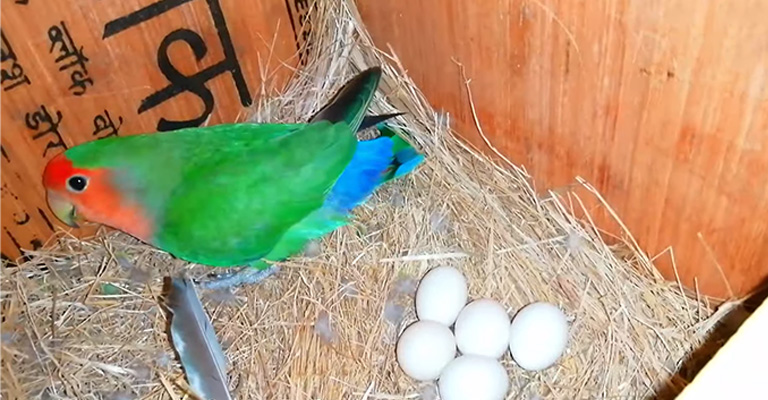
Love Birds Break And Throw Their Eggs- Causes
Lovebirds are small and colorful parrots that are popular as pets or aviary birds. They are also known for their strong pair bonds and affectionate behavior.
However, sometimes, lovebirds may break and throw their eggs, which can be distressing for the owners and the birds themselves.
Here are some possible causes of why lovebirds may break and throw their eggs:
Stress
Stress is one of the most common causes of egg breaking and throwing in lovebirds. Stress can be caused by various factors, such as noise, disturbance, overcrowding, predators, illness, injury, or changes in the environment or routine.
Stress can make lovebirds nervous, aggressive, or depressed and affect their hormonal balance and reproductive behavior.
Diet
Diet is another important factor that affects the health and fertility of lovebirds.
A poor or imbalanced diet can lead to nutritional deficiencies, such as calcium, vitamin D, or protein deficiency, that can weaken the eggshells or cause egg binding (a condition where the egg gets stuck in the oviduct).
A poor diet can also reduce the appetite and energy of lovebirds and make them less interested or able to care for their eggs.
Age
Age is another factor that influences the reproductive performance of lovebirds.
Young or old lovebirds may not have enough experience or maturity to breed successfully. They may not know how to build a proper nest, incubate the eggs, or feed the chicks.
They may also lack the parental instincts or skills to protect and nurture their offspring. Young or old lovebirds may break or throw their eggs out of curiosity, frustration, or ignorance.
Incompatibility
Incompatibility is another reason why lovebirds may break or throw their eggs. Sometimes, lovebirds may not form a strong pair bond with their mate or may have conflicts or disagreements with them.
They may not cooperate or coordinate well in building a nest, incubating the eggs, or raising the chicks. They may also compete or fight over resources, such as food, water, space, or toys.
Incompatible lovebirds may break or throw their eggs out of resentment, jealousy, or dominance.
Infertility
Infertility is another cause of egg breaking and throwing in lovebirds. Some lovebirds may be infertile due to genetic, hormonal, or environmental factors.
They may not be able to produce viable eggs or sperm or fertilize the eggs properly.
Infertile lovebirds may sense that their eggs are not viable and break or throw them away as a way of discarding them.
Overproduction
Overproduction is another factor that can lead to egg breaking and throwing in lovebirds. Some lovebirds may produce too many eggs in a short period of time, which can strain their body and resources.
They may not be able to provide enough calcium, protein, or energy for themselves and their eggs. They may also not have enough space, time, or attention to care for all their eggs.
Overproducing lovebirds may break or throw some of their eggs to reduce their burden.
Parasites
Parasites are another threat that can affect the survival and quality of lovebird eggs.
Some parasites, such as mites, lice, fleas, worms, or fungi, can infest the nest, the feathers, the skin, or the internal organs of lovebirds. They can cause irritation, infection, inflammation, or damage to the birds and their eggs.
They can also transmit diseases or toxins that can harm the birds and their eggs. Parasitized lovebirds may break or throw their eggs to get rid of them.
Predators
Predators are another danger that can cause egg-breaking and throwing in lovebirds.
Some predators, such as cats, dogs, rats, snakes, hawks, owls, or humans, can attack or harass lovebirds and their nests. They can scare, injure, or kill the birds or their eggs.
They can also steal or destroy the eggs. Predator-exposed lovebirds may break or throw their eggs to distract or defend themselves.
Accidents
Accidents are another possibility that can result in egg breaking and throwing in lovebirds. Some accidents, such as falls, collisions, or spills, can damage or dislodge the eggs from the nest.
They can also injure or stun the birds or their eggs. They can also cause confusion, panic, or shock in the birds. Accidental lovebirds may break or throw their eggs by mistake or by reflex.
Love Birds Break And Throw Their Eggs- How To Stop Them
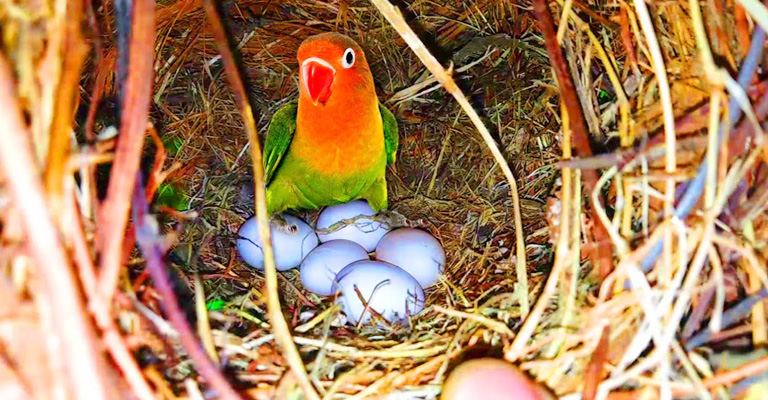
It can be concerning when lovebirds exhibit egg-breaking behavior. To address this issue, here are some effective tips to help stop lovebirds from breaking and throwing their eggs:
Provide a Nesting Box
Offering a suitable nesting box can encourage a sense of security for your lovebirds. Choose a cozy and enclosed box with proper bedding to mimic their natural nesting environment.
Monitor Environmental Stressors
Stress can trigger egg-breaking behavior. Ensure their environment is quiet, free from disturbances, and away from other pets or loud noises that might unsettle them.
Adjust Diet and Nutrition
A balanced diet is crucial. Providing a variety of fresh fruits, vegetables, high-quality pellets, and calcium-rich foods can help support their reproductive health and reduce the chances of egg-related problems.
Control Lighting
Mimic natural light patterns by ensuring consistent lighting hours. Inconsistent lighting can disrupt their internal clocks, potentially leading to erratic nesting behavior.
Limit Nesting Material
While some nesting material is essential, excessive material can lead to anxious nesting behaviors. Keep nesting material minimal to prevent the urge to excessively rearrange or throw eggs.
Offer Distraction and Enrichment
Provide toys and activities to keep them mentally engaged and alleviate boredom, which might contribute to egg-breaking tendencies.
Observe Behavior
Carefully monitor their behavior. If you notice them showing signs of discomfort around the nesting area, consider removing the eggs and the nesting box for a while to break the cycle.
Consult a Veterinarian
If the behavior persists, consult an avian veterinarian. Medical issues, such as hormonal imbalances, can contribute to unusual nesting behaviors, and a vet can provide professional guidance.
Consider Neuter or Separate
If egg-laying becomes a chronic issue, consult a veterinarian about the possibility of neutering or separating the birds. This can help address hormonal imbalances that lead to excessive nesting.
Lovebirds breaking and throwing eggs can be a result of various factors, from stress to inadequate nesting conditions.
By creating a comfortable environment, providing a balanced diet, monitoring their behavior, and seeking professional advice if needed, you can take steps to mitigate this behavior and ensure the well-being of your beloved feathered companions.
Which Bird Breaks And Throws Their Eggs
There are many birds that may break and throw their eggs for various reasons, such as stress, diet, age, incompatibility, infertility, overproduction, parasites, predators, or accidents.
Here are some examples of birds that may break and throw their eggs:
Lovebirds
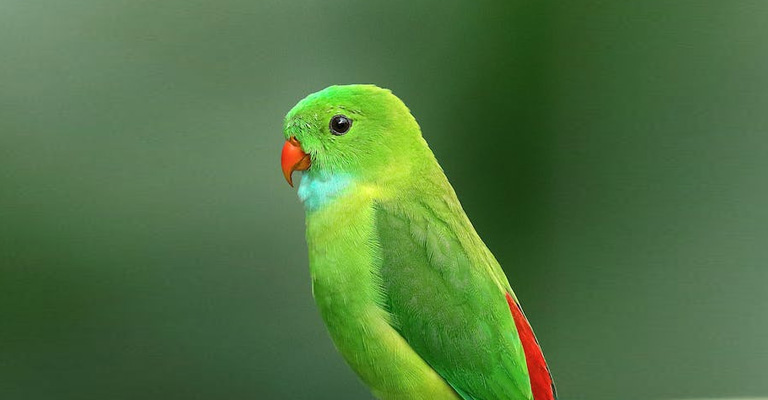
Lovebirds are small and colorful parrots that are popular as pets or aviary birds. They are also known for their strong pair bonds and affectionate behavior.
However, sometimes, lovebirds may break and throw their eggs, which can be distressing for the owners and the birds themselves.
Crows
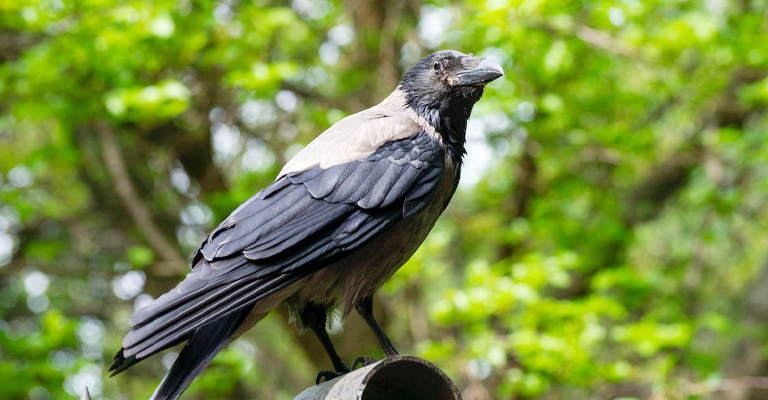
Crows are intelligent and adaptable birds that can live in almost any habitat. They are also opportunistic and omnivorous feeders that will eat anything from seeds and fruits to insects and carrion.
Sometimes, crows may break and throw the eggs of other birds, such as songbirds or waterfowl, as a way of reducing competition or obtaining food.
Chickens
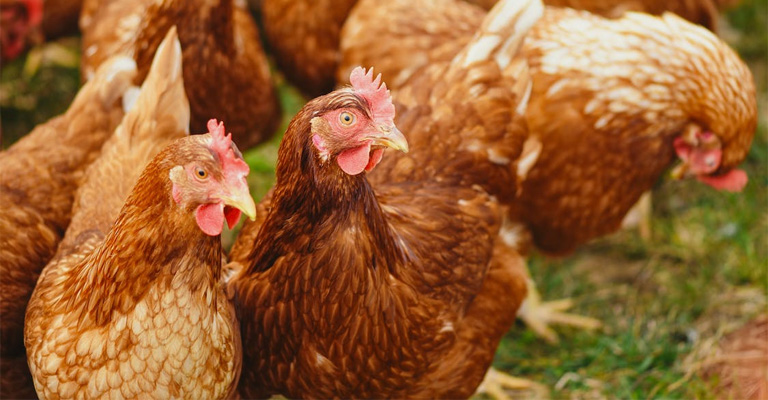
Chickens are domesticated birds that are raised for their eggs and meat. They are also social and hierarchical birds that form pecking orders among themselves.
Sometimes, chickens may break and throw their own eggs or the eggs of other chickens as a way of expressing dominance, aggression, or boredom.
Gulls

Gulls are seabirds that can be found near coasts, lakes, rivers, or islands. They are also versatile and opportunistic feeders that will eat anything from fish and shellfish to garbage and human food.
Sometimes, gulls may break and throw the eggs of other birds, such as terns or plovers, as a way of stealing their nesting sites or preying on their offspring.
Parakeets
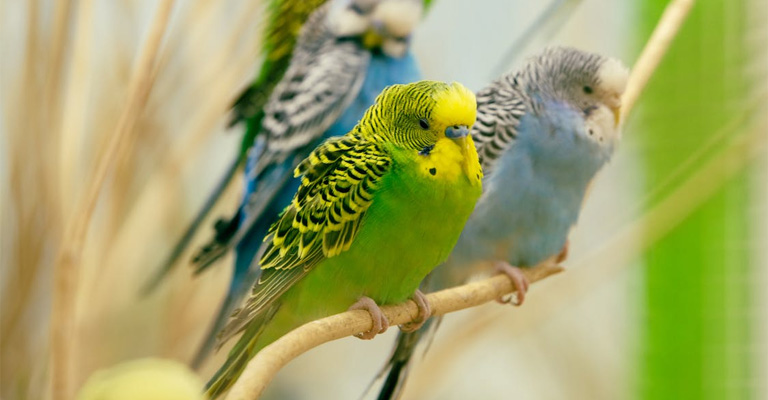
Parakeets are small and colorful parrots that are popular as pets or aviary birds. They are also playful and vocal birds that can mimic sounds and words.
Sometimes, parakeets may break and throw their eggs, which can be caused by various factors, such as stress, diet, age, incompatibility, infertility, overproduction, parasites, predators, or accidents.
Magpies
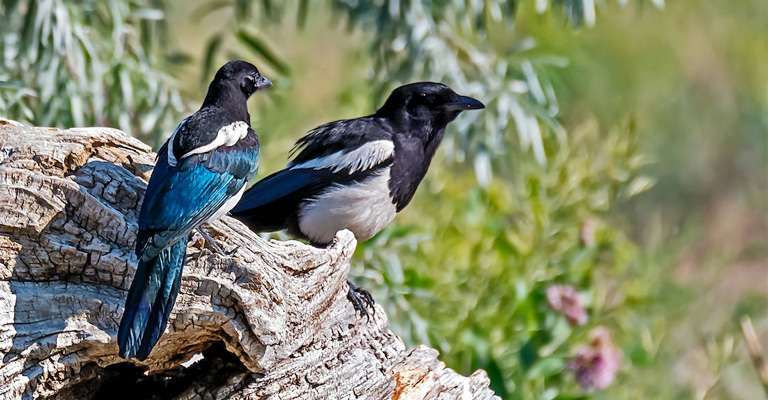
Magpies are corvids that are known for their black-and-white plumage and long tails. They are also smart and curious birds that can recognize themselves in mirrors and collect shiny objects.
Sometimes, magpies may break and throw the eggs of other birds, such as robins or sparrows, as a way of eliminating rivals or exploiting resources.
Ostriches
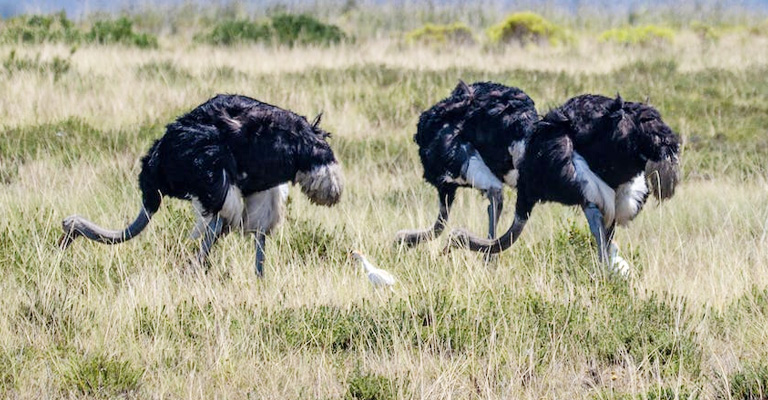
Ostriches are the largest and heaviest living birds. They are also fast runners that can reach speeds of up to 70 km/h (43 mph). They live in dry and hot habitats, such as deserts and savannas.
Sometimes, ostriches may break and throw their own eggs or the eggs of other ostriches as a way of culling the weakest or excess eggs or protecting the remaining eggs from predators.
Cuckoos
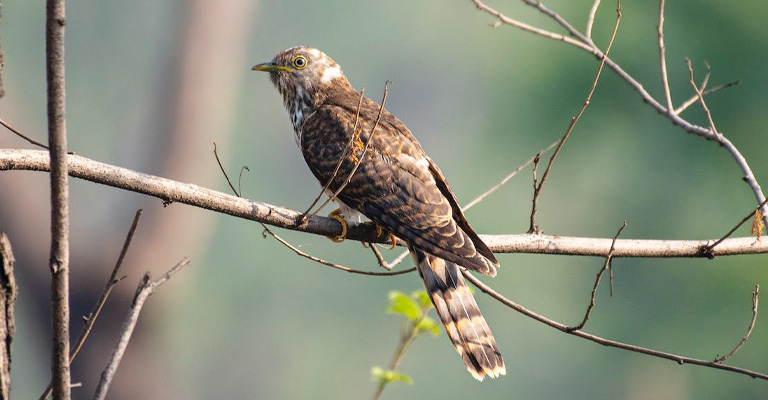
Cuckoos are brood parasites that lay their eggs in the nests of other birds, such as warblers or flycatchers.
They rely on the host birds to incubate their eggs and raise their chicks. Sometimes, cuckoos may break and throw the eggs of the host birds as a way of ensuring that their own eggs have more chances of survival and success.
Penguins

Penguins are flightless birds that live in cold and harsh environments. They have thick feathers and a layer of fat that insulate them from the cold.
They also have a large stomach that can hold up to 30% of their body weight in food. Sometimes, penguins may break and throw their own eggs or the eggs of other penguins as a way of coping with stress, hunger, or grief.
FAQ
Lovebirds may break and discard eggs due to stress, inadequate nesting conditions, nutritional imbalances, or hormonal fluctuations. It can also be a natural response to perceived threats or unsuitable surroundings.
Yes, stress is a common cause. Factors like loud noises, sudden movements, new environments, or disturbances can stress lovebirds and lead to egg-breaking tendencies.
Offer a well-enclosed and secure nesting box with proper bedding. Provide a quiet and private area away from disturbances to make them feel safe and comfortable.
Yes, an imbalanced diet can lead to egg-related issues. Ensure they receive a varied diet rich in nutrients, including calcium. Consult a veterinarian for dietary recommendations.
Monitor their behavior closely. If you notice signs of discomfort around the nesting area, temporarily remove the eggs and the nesting box.
Consult an avian veterinarian if the behavior persists for professional guidance and potential medical interventions.
Conclusion
In the intricate world of avian behaviors, lovebirds breaking and discarding their eggs can be attributed to a mix of physiological, psychological, and environmental factors.
By identifying and addressing the root causes, owners can alleviate stress, improve nutritional balance, and provide appropriate nesting conditions.
Patience, observation, and a proactive approach play crucial roles in helping lovebirds overcome this behavior.
Remember that these actions are often the result of the birds’ responses to their surroundings, and with care and dedication, it’s possible to create a safe and comfortable habitat that encourages healthy nesting behaviors.
Ultimately, by working to understand and mitigate this issue, owners can enhance their lovebirds’ quality of life and foster a bond based on trust and care.